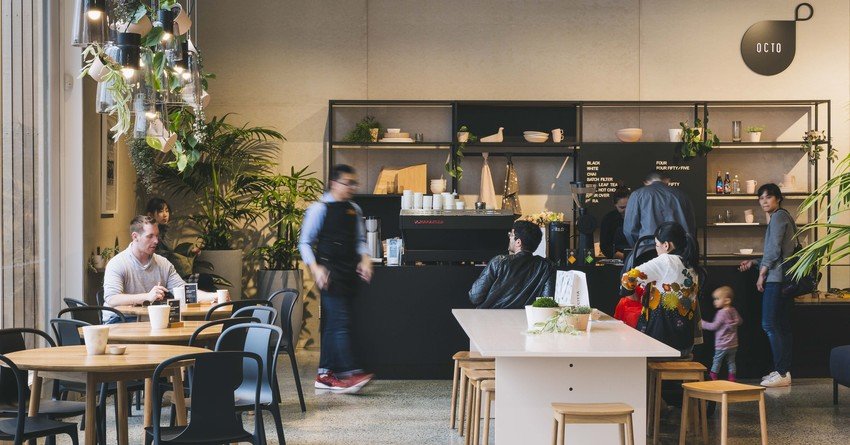Enhancing the experience: Città Design’s ‘permanent pop-up’

The rise of mixed-use spaces has seen substantial growth as retailers look to hospitality to revamp their own consumer experience.
Besides the obvious differences of one focusing on dining experiences and the other on product retail, the two sectors are depending more on the other as consumers turn to demand a cohesive experience from each rather than just standard separate services.
According to Mark Knoff-Thomas, chief executive of the Newmarket Business Association, the old simple strategies of retail are not cutting it any longer with consumers. Newmarket is an Auckland neighbourhood which was formerly best-known for retail, but recently has been beefing up its food and beverage offering with cult favourites like Burger Burger and Little & Friday.
“I mean there is so many offerings now available to anybody to buy stuff, through a multitude of ways that didn’t exist in the past,” Knoff-Thomas says. “I think you need to have a reason, or a call to action to bring someone in. It’s not just about the product, it’s about the experience and the product and the ties you have to the brand you’re associating yourself with.”

Newmarket
He highlights the importance of experiential retail, but says it’s important for retailers offering an experiential component to keep it tailored to their store’s demographic. Your in-store experience must continuously resonate with your customer, Knoff-Thomas says.
“Retail is a tough industry, you have to work on your target base and you have to work on the consumers, and have reasons for people to be in your store. But you need that point of difference because consumers are up for it. Hospitality definitely does add to that experience that online shopping can’t compete with.”
The standard food court and retail models have become outdated, according to Knoff-Thomas, who believes retail spaces should evolve as consumer expectations change.
“Hospitality, like retail, is very fickle. You’re only as good as your last meal, you’re only as good as your last piece of clothing. I think having a point of difference and evolving consistently helps businesses in the long run.”
Knoff-Thomas warns that retailers who don’t evolve with changing consumer demands may not remain in business for long.
“I think that if you want to make a go of it, with a retail store, you have to be willing to evolve – if you don’t the rest of the world will evolve around you. You’ll look out of place and you’ll just fall off – because that’s what happens. It’s a constant evolution, and you need to go into it with passion and enthusiasm, know what you’re doing and know who you’re talking too.”
Adding hospitality offerings into your store isn’t just for big players with pockets deep enough to open an on-site café or a dining lane. Smaller independent retailers are also getting on board, often co-locating with independent hospitality businesses rather than taking on the risk of a food-related brand extension.

Mark Knoff-Thomas
The permanent pop-up
Chief executive and founder of Città, Margot Acland, has targeted the Città demographic by recently creating a pop-up coffee kiosk inside her Newmarket store.
“We’ve opened up a pop-up café in Newmarket, and it’s because we’ve found the café in [Mt Eden collaborative retail space] Bloc has been really successful, it just adds another vibe to the place. The lovely smell of coffee and more people coming and going, and you do find when they come in for coffee they often pop downstairs, browse around and buy something.”

As a high-end design store, Città has a way of drawing in consumers for what it sells, but it has now added to that pull with a hospitality offering that’s due to become permanent.
“The Newmarket store is 650 square metres, so it’s a big store,” says Acland. “We thought it could feel a bit cavernous with nothing going on there.”
“We’re going to go through the council process and are working on [council regulations for the pop-up café] to become a permanent structure, unless it’s a complete failure, but I’m sure it won’t be.”

Città is located in the heart of Newmarket. It knows its target market, and with that information, it can better attune its new hospitality offering to that group of shoppers.
“Most of our shoppers are women, and I know that when I go out in winter I want something warm, and something refreshing in summer. So we’re just going to offer the sort of food that caters to our largest demographic.”
“We want to entice customers in as well as create an experience while they’re already there – it’s both in the sense that some people will be enticed in because they want to have a coffee, but it also really creates and improves that atmosphere.”
Acland agrees with Knoff-Thomas that both retail and hospitality intermesh in people’s lives. She says the change in consumer demand was a factor with launching and possibly continuing this offering.
“I think because we’ve seen successful examples of it elsewhere it was just the natural thing to do, and if it works well, we’re thinking to launch it out to our other stores too.
“The response to the pop-up so far has been extremely positive. They have been really busy, more so in the weekend but building every day. We’re lucky because there isn’t a lot of choice around where we are. We’re offering a range of different coffees, so instead of offering one brand, we offer a different brand on each day.”
Adding to the experience, Citta offers up to six different types of coffee to keep its offer interesting to regular customers, changing up the offer depending on the day. Little things such as that attention to detail are what effect the consumer the most when a hospitality offer is included.





